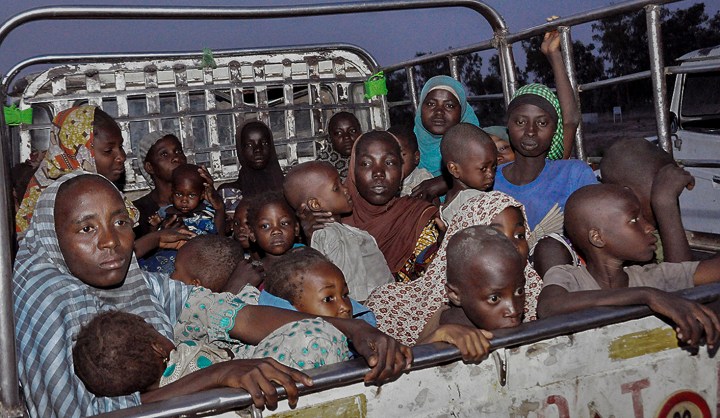Africa
Nigeria: Is Boko Haram on the run?

For the first time in years, the Nigerian army appears to be enjoying the upper hand over Boko Haram, with a string of high-profile successes against the group – most recently, the liberation of 234 kidnapped women and children from a Boko Haram stronghold in the Sambisa Forest. SIMON ALLISON assesses the extent of the damage inflicted on the Islamist militants.
Shortly after the anniversary of the kidnapping of the Chibok girls – the incident which sparked the #BringBackOurGirls campaign and put the international spotlight on the Nigerian government’s failure to deal with growing Boko Haram threat – the Nigerian army announced a series of successful operations against the Islamist militant threat.
The most recent was on Friday, when 234 women and children were rescued from captivity in the Sambisa Forest, a Boko Haram stronghold in north-eastern Nigeria. The massive forest (60,000 square kilometres, which is slightly bigger than the whole of Togo) is largely ungoverned and runs across the borders of several of the states most affected by the conflict, including Borno, Yobe, Gombe and Kano.
“We thank God to be alive today. We thank the Nigerian army for saving our lives,” said one of the rescued victims. In the last few weeks, an estimated seven hundred kidnap victims have been rescued from the forest. Incidentally, none of the Chibok girls are thought to be among the rescued (although the fixation on them, often to the exclusion of most other Boko Haram victims, continues to baffle).
These are rare successes for an army that has, in recent years, become more used to humiliating defeats at the hands of the better-trained, better-motivated and often better-equipped militants. Even Boko Haram’s high-profile setbacks earlier this year came at the hands of regional rather than Nigerian troops.
It’s tempting to speculate on what’s changed. Why is Nigeria suddenly enjoying the upper hand? One factor must be the involvement of those regional troops, which is freeing up the Nigerian army’s limited resources. Another may be the training and direction provided by private security contractors, many of whom are South African. Yet another may be timing – with President Goodluck Jonathan’s administration on its way out, perhaps senior officials are seeking to leave a legacy before they are replaced. Or, more likely, generals are energetically auditioning to keep their posts under the new regime.
An even more significant question, however, is what this means in the long-run for Boko Haram. Is this a mortal blow, the beginning of the end for the Isis-aligned militants? Or is it just a flesh wound?
“It would be fair to say that significant territorial gains have been made against the group and that there has been somewhat of a turning in the tide in the Boko Haram war,” said Ryan Cummings, a Boko Haram specialist at risk analysis firm Red24. Cummings cautions, however, that there’s little evidence to show that Boko Haram has lost much in the way of personnel or equipment. Instead, evidence suggests that liberated territory had been hastily abandoned as government forces advanced – a tactical retreat rather than a defeat.
“With the leadership of the group still intact, Boko Haram may continue to possess the acumen to replenish, regroup and rearm both within and outside of Nigeria’s borders. On the issue of borders, it’s also worth noting that much of the anti-Boko Haram initiatives have been focussed within Nigerian territory. While this region is where Boko Haram is most pronounced, the fact is that the sect has and continues to maintain an operational presence in Cameroon, and to a lesser extent Niger, and little has so far been done to counter the Boko Haram threat in this region,” he said. As if to underline his point, Boko Haram’s highest-profile attacks in recent weeks occurred in neighbouring countries. In mid-April, Boko Haram gunmen killed 16 civilians in a village in Cameroon, while 74 people in Niger died (both soldiers and militants) when hundreds of militants attacked an island on Lake Chad by motorised canoe last week.
Martin Ewi, senior researcher at the Institute for Security Studies, echoes Cummings’ perspective. “I think we should call it a tactical retreat by Boko Haram and not really a defeat,” he said. Nonetheless, this is still a sign of weakness. “Certainly their fighting capability has been reduced, to the extent they can no longer stand head to head with the Nigerian military.”
But the major problem is simply the scale of the group’s activities, which makes it almost impossible for them to be surrounded – even within the confines of the Sambisa Forest. “Sambisa Forest is a huge forest, so it’s not a forest you can just go into and flush out everyone there. While you are busy on one side, they are busy moving into the other side. So the forest can actually provide sanctuary to the group at different points, and I don’t think the Nigerian military, even combined with neighbouring countries, can encircle the whole forest so that Boko Haram won’t have any hiding holes.”
Boko Haram, in other words, are down but not out. But while they remain a serious threat to both Nigeria and the region, the good news is that – finally – the fight back has begun in earnest. DM
Photo: Nigerian women and children rescued from Boko Haram insurgents in Sambisa forest arrive under the care of the National Emergency Management Agency (NEMA) at Malkohi camp in Yola, Nigeria, 03 May 2015. The Nigerian military reported Boko Haram hostages were held in terrible conditions in the Sambisa Forest after they freed nearly 500 women and girls throughout this week. EPA/STR


















 Become an Insider
Become an Insider